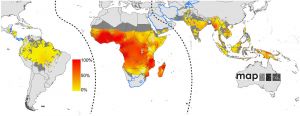Template:Main Page News: Difference between revisions
From Embryology
mNo edit summary |
mNo edit summary |
||
| Line 1: | Line 1: | ||
{| width=800px| | {| width=800px| | ||
|-bgcolor="CEDFF2" | |-bgcolor="CEDFF2" | ||
| <span style="font-size:150%">'''News - Abnormal Development - | | <span style="font-size:150%">'''News - Climate Change Abnormal Development - Environmental'''</span> | ||
|-bgcolor="F5FAFF" | |-bgcolor="F5FAFF" | ||
| valign=top|[[File: | | valign=top|[[File:Malaria global limits 2007.jpg|thumb|link=Abnormal Development - Malaria|Global limits and endemicity of P. falciparum in 2007]] | ||
''' | '''European Scientific Conference on Applied Infectious Disease Epidemiology''' ([https://www.escaide.eu/en ESCAIDE], Nov 2019) | ||
[https://blogs.plos.org/everyone/2020/01/21/escaide-2019/ PLOS Blog] | |||
:"On the impact of climate change on human disease epidemiology, Dr. Henriette De Valk and Prof. Ana Maria de Roda Husman presented informative and sobering overviews on changes in vector-borne, water-borne, and other diseases that have been observed and can be expected to occur in the future. Warming temperatures in Europe create opportunities for mosquitos and other disease vectors to spread further North, reaching new human populations, as has been the case with {{West Nile virus}}. The conclusion drawn from their talks is that time is running out and action is needed now to stop things becoming much worse later down the line." | |||
:'''Links:''' {{ | :'''Links:''' {{abnormal environmental}} | {{West Nile virus}} | {{Malaria}} | ||
{| class="wikitable mw-collapsible mw-collapsed" | {| class="wikitable mw-collapsible mw-collapsed" | ||
! Older News Articles | ! Older News Articles | ||
|- | |- | ||
| [[Template_talk:Main_Page_News|'''Older News Articles''']] - [[Template_talk:Main_Page_News#February|Rare Sesquizygotic Twinning]] | [[Template_talk:Main_Page_News#June|Australia's mothers and babies 2017]] | [[Template_talk:Main_Page_News#October|Spinal Muscular Atrophy Screening]] | [[Template_talk:Main_Page_News#February|Australian 2018 Pregnancy Care Guidelines]] | [[Template_talk:Main_Page_News#July|CRISPR]] | [[Template_talk:Main_Page_News#June|Ronan O’Rahilly]] | [[Template_talk:Main_Page_News#February|Gestational Diabetes]] | [[Template_talk:Main_Page_News#September|Kyoto eBook]] | [[Template_talk:Main_Page_News#August|Dolly's sisters live on!]] | [[Template_talk:Main_Page_News#June|Thalidomide in Zebrafish]] | [[Template_talk:Main_Page_News#March|Human pancreas stem cells]] | [[Template_talk:Main_Page_News#January|Oral contraceptive no risk of major birth defects]] | [[Template_talk:Main_Page_News#September|Maternal Malaria Neurovascular Development Effects]] | [[Template_talk:Main_Page_News#June|Oocyte/Spermatozoa fate decision]] [[Template_talk:Main_Page_News#April|Rubella eliminated in the Americas]] | [[Template_talk:Main_Page_News#February|Three-person embryos]] | | [[Template_talk:Main_Page_News|'''Older News Articles''']] - [[Template_talk:Main_Page_News#December|Air Pollution]] | [[Template_talk:Main_Page_News#February|Rare Sesquizygotic Twinning]] | [[Template_talk:Main_Page_News#June|Australia's mothers and babies 2017]] | [[Template_talk:Main_Page_News#October|Spinal Muscular Atrophy Screening]] | [[Template_talk:Main_Page_News#February|Australian 2018 Pregnancy Care Guidelines]] | [[Template_talk:Main_Page_News#July|CRISPR]] | [[Template_talk:Main_Page_News#June|Ronan O’Rahilly]] | [[Template_talk:Main_Page_News#February|Gestational Diabetes]] | [[Template_talk:Main_Page_News#September|Kyoto eBook]] | [[Template_talk:Main_Page_News#August|Dolly's sisters live on!]] | [[Template_talk:Main_Page_News#June|Thalidomide in Zebrafish]] | [[Template_talk:Main_Page_News#March|Human pancreas stem cells]] | [[Template_talk:Main_Page_News#January|Oral contraceptive no risk of major birth defects]] | [[Template_talk:Main_Page_News#September|Maternal Malaria Neurovascular Development Effects]] | [[Template_talk:Main_Page_News#June|Oocyte/Spermatozoa fate decision]] [[Template_talk:Main_Page_News#April|Rubella eliminated in the Americas]] | [[Template_talk:Main_Page_News#February|Three-person embryos]] | ||
|} | |} | ||
|} | |} | ||
Revision as of 10:08, 29 January 2020
| News - Climate Change Abnormal Development - Environmental |
|
European Scientific Conference on Applied Infectious Disease Epidemiology (ESCAIDE, Nov 2019)
|
